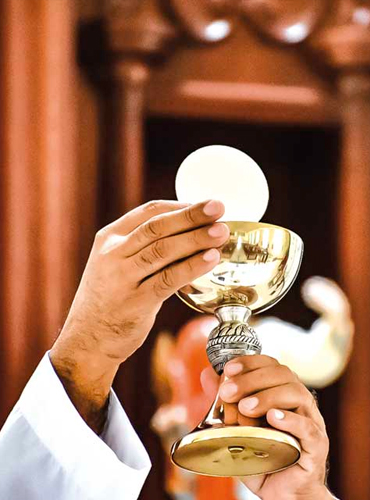Friday of the Third Week of Easter – Option 1 – Jn 6:52-59
In today’s Gospel, Jesus insists that His Flesh is true food, and His Blood is true drink. In fact, three times Jesus uses the phrase “eat My flesh and drink My blood.” Part of the reason the Jews are so astounded is because the Greek word Jesus uses for eat, τρώγω (trogo), literally means a very physical eating, to gnaw, to munch, or to crunch. Although the Jews understand that eating usual food gives physical life, they fail to see how eating Christ’s flesh and drinking His blood would give them the supernatural life that Jesus speaks of.
The same might be said of us. We may not see God’s power revealed in the Eucharist, but that’s part of the point. Having God’s power hidden under the appearance of bread has at least three advantages for us: first, it makes us grow in faith, since we only have the words of Our Savior to believe in. This is the essence of faith, to believe even though we cannot see, simply because Our Lord has revealed this truth to us. Secondly, it makes us grow in humility, since, when we see how Jesus comes down from heaven to be with us under the simple appearance of bread, how can we not be moved to be humble ourselves? Thirdly, God’s presence in the Eucharist is an act of mercy: as Saint Teresa of Jesus wrote “How would I, a poor sinner, who have so often offended You, dare to approach You, O Lord, if I beheld You in all Your Majesty? Under the appearances of bread, however, it is easy to approach You, for if a king disguises himself, it seems as if we do not have to talk to him with so much circumspection and ceremony. If You were not hidden, O Lord, who would dare to approach You with such coldness, so unworthily, and with so many imperfections?”
Sometimes, though, Jesus allows us to see clearly how the Eucharist is true food and drink, surpassing all earthly food. For instance, Blessed Alexandrina Maria da Costa, a Portuguese woman who died in 1955, lived for more than 30 years on the Eucharist alone, neither eating nor drinking. The doctors were so astounded that they ordered her to be practically imprisoned in a hospital for 40 days so they could see if she ever ate anything. In the end, doctors could find no scientific explanation for her fast, and even the unbelieving doctor was forced to admit it was a miracle.
In prayer Jesus told Alexandrina: “You are living by the Eucharist alone because I want to prove to the world the power of the Eucharist and the power of my life in souls.” Of course, this sort of miracle is not a common place occurrence, but it does make us ask ourselves some questions: how strongly do we believe in Jesus’ Presence in the Eucharist? Do we really believe that He is there, under the veils of bread and wine? Do we take time to be with Him in prayer? Do we believe “in the power of the Eucharist and the power of Jesus’ life in souls”?
Today, let us ask for the grace, through the intercession of Mary, Mother of the Eucharist, to come to love the Eucharist and to see more clearly Christ’s love for us as revealed in it.






